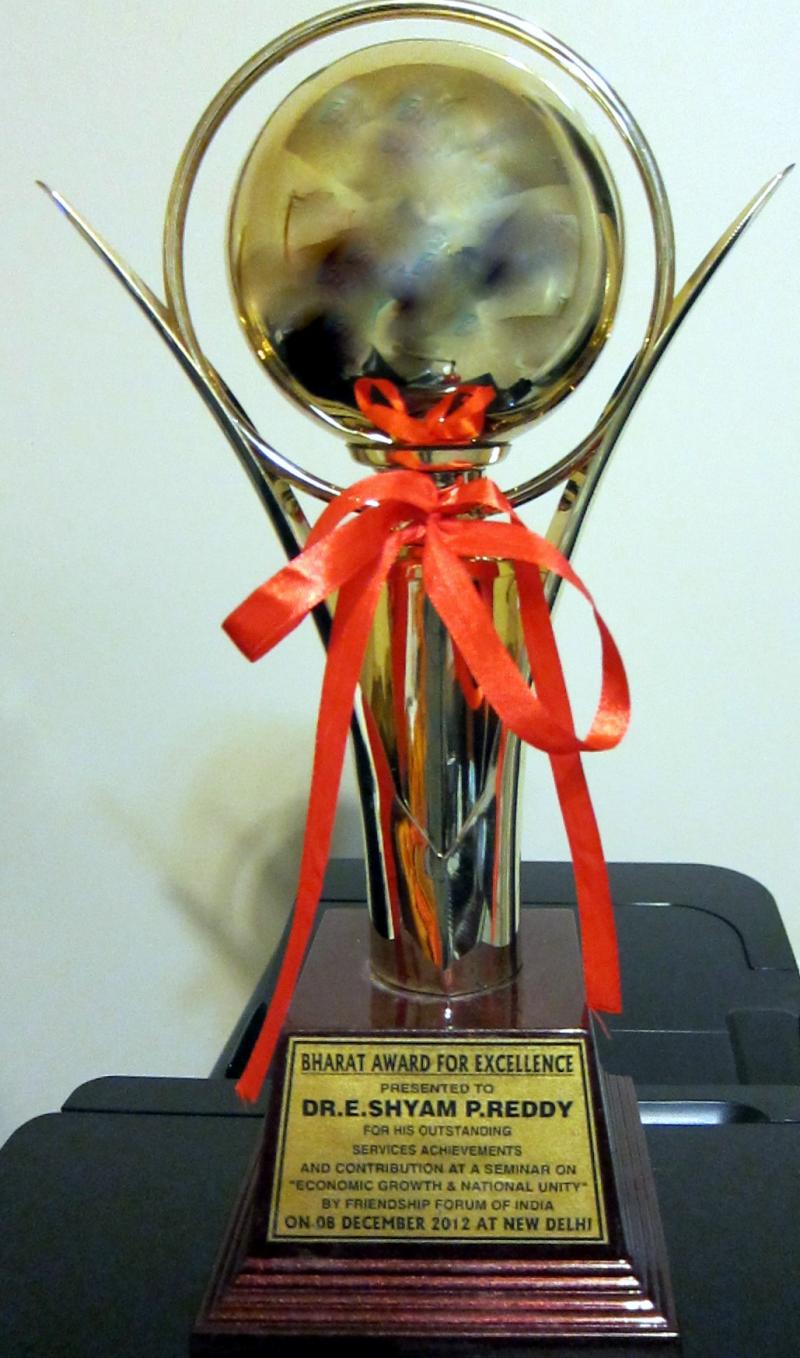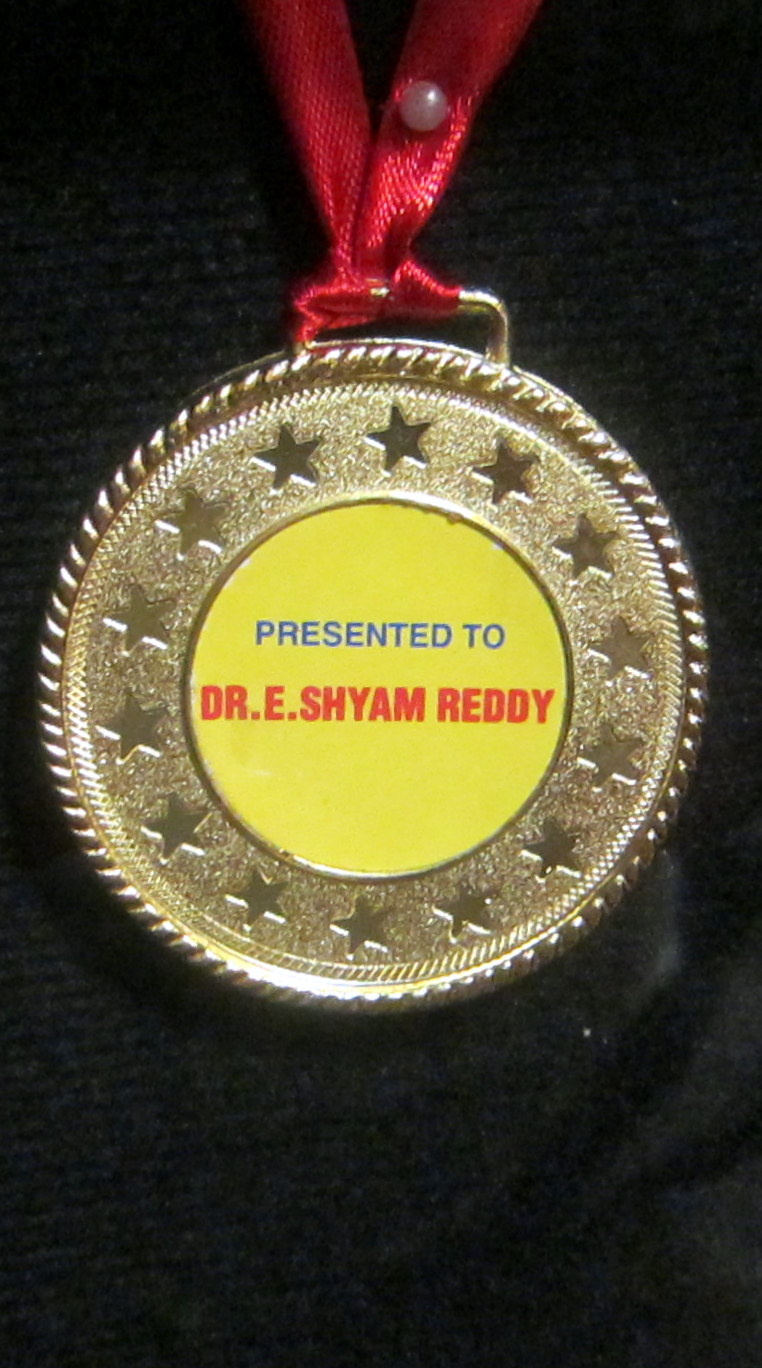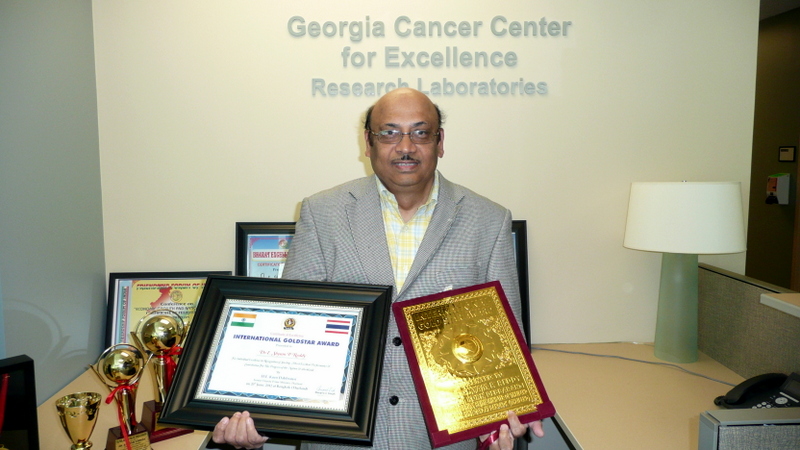Functionotherapeutics: Gene Discovery and Function based Therapeutic Strategies
to
PROSTATE CANCER, EWING SARCOMA, BREAST CANCER, LUNG CANCER, OVARIAN CANCER, PANCREATIC CANCER
Dr E. Shyam P. Reddy,
Functionotherapeutics,
Professor and Director, Cancer Biology Program, Dept of OB/GYN, Morehouse School of Medicine, 720 Westview Drive
Atlanta, GA 30310
United States
ph: 404-756-5230
fax: 678-623-5999
ereddy
- Home
- Discovery of Pri-Micro RNA-Encoded Proteins/ Peptides in mammalian cells
- Our Novel Prediction that mRNA may function like lncRNA, pri-miRNA or miRNA comes to reality
- NOVEL THERAPY FOR PROSTATE CANCER
- About Us
- HONORS and AWARDS
- Gene Discovery/Road map to Therapy
- our achievements
- LIFETIME ACHIEVEMENT AWARD, Mother Teresa Excellence Award
- MAHATMA GANDHI PRAVASI GOLD MEDAL
- Novel Targeted Therapeutic Agents against ERG-positive Prostate Cancer
- ERG GENE and PROSTATE CANCER
- ERG Oncogene and TGF beta signaling in Prostate Cancer
- Anti-epilepsy drug Valproic acid targets ERG-positive Prostate cancers
- Novel research in Breast Cancer
- Facts about PROSTATE CANCER
- BEST PERSONALITIES OF INDIA AWARD, SUPER ACHIEVERS OF INDIA AWARD, BHARAT EXCELLENCE AWARD
- International Goldstar Award, 2012
- Bharat Gaurav Award
- CPDR Saturday Distinguished Visiting Professor
- TAMA AWARD
- Services to enrich knowledge and life
- NOVEL DISCOVERY
- Contact Us
- Latest News
- Latest News Continued
- BREAKING NEWS
- KEY WORDS
- CANCER and Frequently asked questions
Home
Dr E. Shyam P. Reddy,
GCC Distinguished Cancer Scholar,
Professor and Director, Cancer Biology Program,
Dept of OB/GYN, MEB C-307, Morehouse School of Medicine,
720 Westview Drive, Atlanta, GA 30310-1495.
Adjunct Professor, Winship Cancer Institute of Emory University
Adjunct Senior Scientist, Tumor Biology Program, UAB
Brief Summary
Dr Shyam Reddy discovered and cloned several cancer genes/oncogenes (close to 20 genes) and studied their functions. The most notable genes discovered by Dr Reddy include ERG-1, ERG-2, ERG-3 and human FLI-1genes. Dr Reddy named the gene as ERG ( ETS Related Gene, published in prestigious journals Science and PNAS) . ERG is a transcriptional factor and also a stem cell factor and is involved in 50-80% of Prostate cancers, Ewing sarcoma, Cervical cancer and also leukemias (AML).
Other notable ETS genes discovered and studied by Dr Reddy include human Fli-1 (involved in 80% of Ewing family of tumors, Leukemias and Prostate cancer), EWS-Fli-1 (involved in 80% of Ewing Sarcoma, Pediatric cancer), EWS-erg (involved in Ewing Sarcoma), TLS-erg (involved in Acute Myeloid Leukemia), EWS (involved in multiple cancers), TLS/FUS (involved in multiple cancers), ELK-1 (Drs Reddy and Rao named this gene as ETS Like Gene, published in prestigious journals Science and Nature), BRCA1a, BRCA1b, BRCA2a (involved in breast, ovarian and prostate cancers) and EWS-ATF-1 (malignant Melanoma of Soft Parts/Clear cell sarcoma)
Dr Reddy and his group have shown that ERG and FLI-1 proteins involved in several cancers are responsible for making cancer cells resistant to chemo-therapeutic agents. They are targeting these onco-proteins or their functions to develop novel targeted therapeutic agents. Using this strategy, they have developed several novel drugs (patent being submitted) that target Prostate cancer, Ewing Sarcoma, Breast cancer (Triple Negative Breast Cancer), Pancreatic cancer, Ovarian cancer, cervical cancer, colorectal cancer, pancreatic cancer etc. These drugs appear to be targeted therapeutic agents with no or little effect on normal cells. Dr Reddy received several grants from DOD to do research on targeted therapeutic drugs against prostate cancer and Ewing Sarcoma. We are grateful to DOD/NIH organizations, GCC distinguished Cancer Scholar award (1.25 millions) for standing up to our cancer research. We have also shown that anti-epileptic drug Valproic acid (VPA) [repurposed drug) targets ERG-positive Prostate cancers and Ewing Sarcoma and identified the molecular mechanism of action of VPA on ERG function.
In order to understand the molecular mechanism by which ETV1 cancer protein causes prostate cancer, Dr Reddy and his Ph.D. student Sharif Morsalin in collaboration with other scientific colleagues discovered that ETV1 cancer protein induces certain enzymes ( kinases) in prostate cancer cells which deregulate the critical protein beta-catenin by protein modification. They have also identified therapeutic agent (commercially available) that interferes with this process. In addition, they have demonstrated that this therapeutic agent targets these prostate cancer cells effectively.
These therapeutic agents will have a profound impact on prevention and treatment of prostate cancer which may help to reduce health disparity seen in minority prostate cancer patients. They also believe that such targeted mechanistic studies will help patients not to undergo unnecessary and more dramatic chemo- therapy treatment
We have identified novel pathways by which ERG/ETS oncoproteins target different signaling pathways that leads to prostate, Ewing sarcoma and other cancers (leukemias, lymphomas and sarcomas). Recently, we have discovered novel molecular mechanism of activation of TGF beta–signaling pathway by ERG oncoprotein in prostate cancer. We are also studying the mechanism of action of successful novel drugs on prostate, breast and childhood cancers including their metastases.
BREAKINGNEWS
Recently Dr Shyam Reddy and his colleagues have made novel discoveries in Cancer Genomics and Cancer Therapy. The discovery in Cancer Genomics may revolutionize future biology.
Discovery of Pri-Micro RNA-Encoded Proteins/ Peptides in mammalian cells
(Click the title above to see the published paper)
In 2017, Dr Reddy and his colleagues at Morehouse School of Medicine has decoded Non-coding DNA (JUNK DNA, 98% of Human Genome) and its non-coding RNA and discovered novel category Pri-Micro RNA-Encoded Proteins/ Peptides in mammalian cells (Importance of these novel miPEPs were reviewed in three reviews shown below). We have shown that Pri-Micro RNA-200a and Pri-Micro RNA-200b encode NOVEL Tumor Suppressors (mi-PEP-200a and mi-PEP-200b) which inhibit migration of Prostate and Breast cancer cells. Recently, we have raised antibodies to miPEP-200s and shown their presence in normal breast and prostate cancer cells (Published, see below for the link). One can use these mi-PEPs as biomarkers and precision therapeutic agents to all Human diseases including all Cancers, Alzheimer’s, Parkinson, Cardiovascular diseases and Pulmonary diseases etc.and also their treatment .
Implications of Our Discovery
This finding suggests that thousands of new/novel functional proteins/peptides are encoded by pri-miRNAs in the mammalian cells. This will revolutionize the future biology, diagnosis and precision therapy.
Thus, these results (proving the existence of pri-miRNA encoded biologically active peptides/proteins in mammalian cells) will revolutionize the biology field per se as they may be involved in growth and development of all humans, animals, plants and other living creatures. Based on our results, we predict that there will be a great number of publications describing novel pri-miRNA encoded peptides/small proteins in mammalian cells will be forthcoming in future that may change the landscape of Biology per se. NIH/NSF/DOD may have to dedicate Billions of Dollars budget for the analysis and study of these novel proteins/peptides.
Fang, Jinbo, Morsalin, Sharif, Rao, Veena N., Reddy, E. Shyam P. Decoding of Non-Coding DNA and Non-Coding RNA: Pri-Micro RNA-Encoded Novel Peptides Regulate Migration of Cancer Cells. J. Pharm. Sci. Pharmacol. 2017;3:23–27.
https://doi.org/10.1166/jpsp.2017.1070
Reviewed :
Zhou B, Yang H, Yang C, Bao YL, Yang SM, Liu J, Xiao YF. Translation of noncoding RNAs and cancer. Cancer Lett. 2021 Jan 28;497:89-99. doi: 10.1016/j.canlet.2020.10.002. Epub 2020 Oct 7. PMID: 33038492.
Our Novel Prediction that mRNA may mediate cellular functions like miRNA, lncRNA, LNC-RNA comes to reality
We also predicted and stated in our paper that " it is also the time to rethink about the new role of messenger RNA (mRNA) of known genes as regulators of biological function of cells like in the case of miRNAs, pri-miRNAs and lncRNAs. In future, if one proves that mRNA may act like miRNA or lncRNA, this will totally change our present understanding of the biological function of coding and non-coding DNAs and RNAs". (please see our reference below for the prediction (high lighted in green) in the text of published paper). We are excited to see the proof was shown by Tomita et al., "extra cellular mRNA transported to the nucleus shows translation independent function' [Nature communications 12, 3655, (2021)]
Fang, Jinbo, Morsalin, Sharif, Rao, Veena N., Reddy, E. Shyam P. Decoding of Non-Coding DNA and Non-Coding RNA: Pri-Micro RNA-Encoded Novel Peptides Regulate Migration of Cancer Cells. J. Pharm. Sci. Pharmacol. 2017;3:23–27.
IMPLICATIONS of OUR DISCOVERY
This finding suggests that thousands of mRNAs (30,000-40,000) are there in cells that we still need to find their RNA-mediated cellular funcions. NIH, DOD and NSF needs to dedicate 1-2 trillion dollars to identify RNA-mediated cellular funcions.
Inhibition of Aortic Medial Calcification: miPEP-200b and miRNA-200b as Potential Mediators
Previously, we demonstrated that primary microRNA-200a (pri-miRNA-200a) and pri-miRNA-200b possess open reading frames (ORF) that were recognized by ribosomes, allowing the pri-miRNAs to be translated into two peptides, miPEP-200a and miPEP-200b. Furthermore, studies have shown that these peptides are involved in the inhibition of cell migration in breast and prostate cancer cells and may even serve as significant prognostic markers of clinical outcomes. We have previously shown that miPEPs have downstream functional effects very similar to their miRNA counterparts, resembling many other protective mechanisms observed in nature. This “double-edged functional sword” allows for continued activity despite decreased functionality in one part of the system.
Although the anti-neoplastic role of these peptides has recently been an area of interest, not much research has been published regarding their role in cardiovascular disease. In one study, it was demonstrated that a single nucleotide polymorphism in the gene coding for miRNA-200b might result in increased protein kinase A (PKA) activity that ultimately leads to activation of thrombocytes and ensuing atherosclerosis. PKA is not only involved in platelet activity but is rather known to play a role in a multitude of cellular pathways. Of interest is PKA’s involvement in medial aortic calcification, a process that has been implicated in isolated systolic hypertension (ISH); this condition is associated with increasing age. We hypothesize that in the same way that miRNA-200b plays a role in decreasing PKA activity in atherosclerotic processes, the peptide miPEP-200b may also act as an inhibitor of PKA-induced aortic medial calcification. If this association is shown to be present, focused therapy with miPEP-200b and miRNA-200b, along with PKA inhibitors, may significantly reduce the incidence, as well as prevalence, of isolated systolic hypertension in older age groups, leading to a decreased incidence of diastolic heart failure secondary to longstanding hypertension.
Sepehr Saberian, Sharif Morsalin, Jinbo Fang, Veena N Rao and E. Shyam P Reddy. Inhibition of Aortic Medial Calcification: miPEP-200b and miRNA-200b as Potential Mediators. LOJ Pharmacology and Clinical Research. 2021,2(5), 258-263,2021 DOI: 10.32474/LOJPCR.2021.02.000147.
https://lupinepublishers.com/pharmacology-clinical-research-journal/pdf/LOJPCR.MS.ID.000147.pdf
Georgia Bio innovation Summit Oct, 2021
miPEP-200b and miRNA200b: a Novel Approach for Developing Targeted Pharmacotherapy.
Sepehr Saberian, Sharif Morsalin, Jinbo Fang, Veena N Rao and E. Shyam P Reddy. miPEP-200b and miRNA200b: a Novel Approach for Developing Targeted Pharmacotherapy. Georgia Bio innovation Summit Oct, 2021.
(Presentation by MD,MBA student Sepher Saberian)
https://www.youtube.com/watch?v=U1Dl9qqWdFw
Glioblastoma Multiforme: Downregulation of miRNA-200 Family and Potential Restoration by miPEP-200. Curtis L. Parker Student Research Symposium.,2022
S Saberian, S Morsalin, J Fang, DA Gimbel, CM Mustroph, S Yousef , Veena N Rao and E. Shyam P. Reddy.
Glioblastoma Multiforme: a miPEP and miRNA Approach.
S Saberian, S Morsalin, J Fang, CM Mustroph, S Yousef , DA Gimbel,Veena N Rao and E. Shyam P. Reddy. (Collaboration with Department of Neurosurgery, Emory University and Department of Emergency Medicine, Emory University, Atlanta, GA). LOJ Pharmacology and Clinical Research. 2022
(Please see the link below)
http://dx.doi.org/10.32474/LOJPCR.2022.03.000153 (2022)
Titilope Olanipekun, Nicolas Bakinde, Kelsey Paul-Stubbs, Ajose Taiwo, Sharif Morsalin, Samir Yezdani, Veena N Rao and E . Shyam P. Reddy, Journal of Cancer epidemiology & Tratment, 3,1-4. (Please click the title above to see the publication)
(Collaboration with Dr Bakinde and residents and MD students )
Precision Therapy for ETV1-positive Prostate Cancer.
Yang, Chunshu, Clopton, Matthew*, Saberian, Sepehr, Morsalin, Sharif, Fang, Jinbo, Fujimura, Yasuo, Rao, Veena N, **Reddy, E. Shyam P.
(Clopton, Matthew, MD student Presentation at UAB Conference, and Curtis L. Parker Student Research Symposium, 2022 Feb)
ERG Gene regulates Adherens Junctions and Permeability in Microvascular Endothelial Cells
Tharakan B, Hunter FA, Muthusamy S, Randolph S, Byrd C, Rao VN, Reddy ESP, Childs EW. ETS-Related Gene Activation Preserves Adherens Junctions and Permeability in Microvascular Endothelial Cells. Shock. 2021 Dec.
doi: 10.1097/SHK.0000000000001899. Epub ahead of print. PMID: 34907119.
(Collaboration with Dr Childs and Dr Tharakan)
A Hypothetical Molecular Mechanism Linking Loss of BRCA1 Function to Infertility
Loni Sneed, Jingyao Xu, Kirat Sandhu, Cyra Mia Bailey Cottrell, Titi Shobayo, Aniah Daniels, Jyothika A Desai, E Shyam P Reddy and Veena N Rao.
Interventions in Gynaecology and Women’s Healthcare, 2022 Feb
https://lupinepublishers.com/gynecology-women-health-journal/pdf/IGWHC.MS.ID.000209.pdf
(Collaboration with Dr Veena Rao )
ETV-1-Related Cellular Pathways as Targets for Melanoma Chemotherapy
Sepehr Saberian, Kelsey Paul Stubbs, Chunshu Yang, Sharif Morsalin, Jinbo Fang, Veena N Rao and E Shyam P Reddy*
LOJ Pharmacology and Clinical Research. 2022; 3(1):293. July, 2022
doi : 10.32474/LOJPCR.2022.03.000154
Each anatomical organ in the body possesses a specialized function. Not only are the functionalities different between organs, but their gross appearance is also visibly discernable. On the contrary, at the cellular level, cells from these different organs operate with strikingly similar molecular pathways. We will examine this characteristic in the case of cancerous prostatic cells and melanocytes and its potential to yield novel therapeutic modalities. A literature search was performed to analyze data regarding the intermediates involved in a main cellular pathway observed in both cell types: wnt and β-catenin. Studies on the efficacy of various treatment modalities in prostate cancer were also analyzed. A convincing body of evidence exists, suggesting inhibition of kinases in this pathway leads to inhibition of ETV-1-positive prostate cancer. Certain cases of melanoma were also found to be ETV-1 positive. We hypothesize that MEKi has tremendous potential for exploration as a potential precision therapeutic agent for treatment of ETV-1-positive melanoma. This medical hypothesis stems from the similarities observed in the presence of wnt and β-catenin in both ETV-1-positive prostate cancer as well as melanoma.
Glioblastoma Multiforme: Downregulation of miRNA-200 Family and Potential Restoration by miPEP-200.
S Saberian, S Morsalin, J Fang, DA Gimbel, CM Mustroph, S Yousef , Veena N. Rao and E. Shyam P Reddy. Southeast Regional Clinical & Translational Science Conference, March 2022.
Please click the link below for more News:
https://www.ajc.com/lifestyles/health/movember-effort-fight-cancer/mDH8hGW6Jfa9wtY2cl0CfJ/
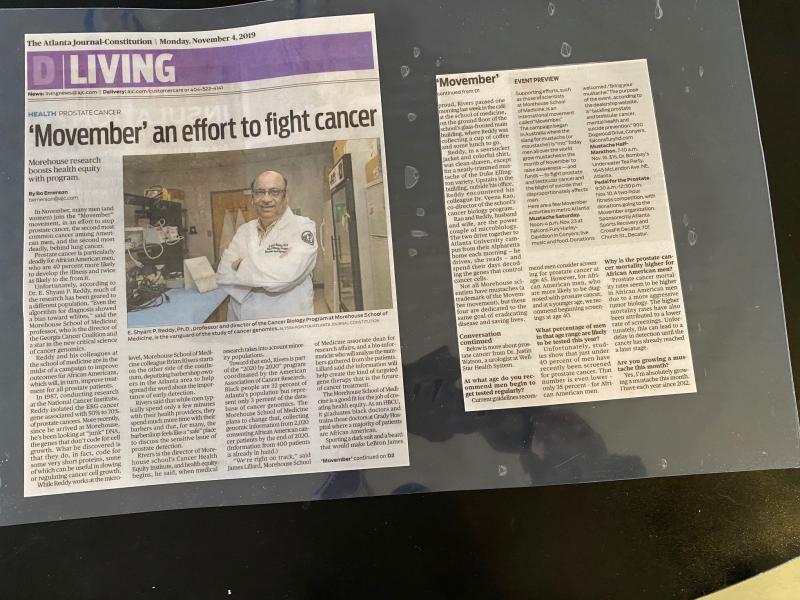


Functionotherapeutics, Cancer Biology Program, Morehouse School of Medicine Received 2020 and 2021 Best of Atlanta Award Hall of Fame in Colleges and Universities (Two consequetive years)
Atlanta Award Program Honors the Achievement
ATLANTA Aug, 2021 -- Functionotherapeutics, Cancer Biology Program, Morehouse School of Medicine has been selected for the 2020 and 2021 Best of Atlanta Award (Hall of Fame) (Two consequetive years) in the Colleges & Universities category by the Atlanta Award Program.
Novel PRECISION THERAPY for Prostate Cancer was discovered by Morehouse School of Medicine Scientists at Cancer Biology Program, Dept of OB/GYN, Georgia Cancer Center for excellence, Grady Hospital, Atlanta
In the United States of America, prostate cancer is the second most common age-related cancer among men. African-American men have the highest incidence of, and mortality rate from this disease and they have twice the risk of developing prostate cancer as Caucasian men. ERG gene (discovered by us) was found to be involved in a majority of human Prostate cancers (50-80%). Another ERG/ETS related gene, ETV1 is believed to be responsible for 10% of prostate cancer.
In order to understand the molecular mechanism by which ETV1 cancer protein causes prostate cancer, Dr Reddy and his Ph.D. student Sharif Morsalin in collaboration with other scientific colleagues Drs Chunshu Yang, Jinbo Fang, Sampreet Reddy, Shubhalaxmi Kayarthodi, Ed Childs, Roland Matthews, Veena N Rao ( from Cancer Biology Program, Dept of OB/GYN, Morehouse School of Medicine, Georgia Cancer Center for Excellence, Grady Memorial Hospital, Atlanta ) discovered that ETV1 cancer protein induces certain enzymes ( kinases) in cancer cells which deregulate the critical protein beta-catenin by protein modification. They have also identified therapeutic agent (commercially available) that interferes with this process. In addition, they have demonstrated that this therapeutic agent targets these cancer cells effectively. These therapeutic agents will have a profound impact on prevention and treatment of prostate cancer which may help to reduce health disparity seen in minority prostate cancer patients. They also believe that such targeted mechanistic studies will help patients not to undergo unnecessary and more dramatic chemo- therapy treatment
Molecular Mechanism of β-Catenin Signaling Pathway Inactivation in ETV1-Positive Prostate Cancers. Sharif Morsalin, Chunshu Yang, Jinbo Fang, Sampreet Reddy, Shubhalaxmi Kayarthodi, Ed Childs, Roland Matthews, Veena N Rao and E. Shyam P. Reddy. Journal of Pharmaceutical Sciences and Pharmacology, Volume 1, Number 2, , pp. 87-100(14)
National Prostate Cancer Awareness Month (September)
Novel Targeted Therapeutic Agents against ERG-Positive Prostate Cancers
We have discovered an important member of the ETS family and named this gene as ERG (Ets Related Gene), which has been shown to be involved in many human cancers (Ewing sarcoma and leukemias). Recently, the ERG gene was found to be involved in a majority of human Prostate cancers (50-80%), resulting in the overexpression of ERG in prostate cancer cells. We have shown that ERG gene codes for sequence specific transcriptional activator. We have previously demonstrated that ERG and aberrant ERG proteins inhibit apoptosis, and this may be one of the reasons for the activation of the ERG gene in leukemias, Prostate cancer and other human solid tumors. Dr Reddy and his colleagues have identified several novel targeted therapeutic agents against ERG-Positive Prostate Cancers.
ERG and Smad3 Proteins Collaborate to Activate TGF-Beta Mediated Signaling Pathway in ERG-Positive Prostate Cancer Cells
African-American men have twice the risk of developing prostate cancer as Caucasian men. ERG gene (discovered by us) was found to be involved in a majority of human Prostate cancers (50-80%). In this study, we demonstrate that ERG oncoprotein physically interacts with Smad3 protein and stabilizes phospho-Smad3 protein and thereby enhance TGF-b/Smad3 signaling pathway in prostate cells. Thus, ERG oncoprotein plays an important role in prostate tumorigenesis by using a novel mechanism to activate TGF-beta/Smad3 signaling pathway. These results will have great implications in the diagnosis and treatment of ERG-positive Prostate cancers.
(Journal of Pharmaceutical Sciences and Pharmacology, 1, 82-85)
Dr Reddy, Dr Rao and his colleagues (Jinbo Fang, Huali Xu, Chunshu Yang, Shubha Kayarthodi, Roland Matthews,Veena N. Rao, and E. Shyam P. Reddy) discovered novel mechanism by which ERG oncoprotein regulates TGF-beta signaling pathway in ERG-positive prostate cancer. It appears that ERG oncoprotein plays an important role in prostate tumorigenesis by activating TGF-β signaling pathway.Thus, these results will have great implications in the diagnosis and treatment of ERG-positive Prostate cancers.
Childhood Cancer Awareness Month (September)
Anti-Epileptic Drug Targets Ewing Sarcoma
Our results (Ph.D. student Shubhalaksmi K. et al., and Reddy) demonstrate that anti-epileptic drug relieves the inhibitory effect of oncoproteins involved in Ewing family of tumors and targets these cancer cells. (Repurposing of existing drugs towards therapy of EWING SARCOMA)
Therapeutic regulation of transcriptional repressor properties of EWS-ERG/EWS-Fli-1 with an anti-Epileptic drug with a promising new potential might have a profound impact on prevention, management and treatment of Ewing Sarcoma. Therapeutic use of FDA approved anti-Epileptic drug in minority patients may help reduce the health disparity seen in Ewing family of tumors. [Shubhalaxmi Kayarthodi, Yasuo Fujimura, Jinbo Fang, Sharif Morsalin, Veena N. Rao, and E. Shyam P. Reddy (Journal of Pharmaceutical Sciences and Pharmacology, 1, 87-100].
Shubhalakshmi Kayarthodi was also awarded The Anthony Shuker Scientific Poster Award for her poster " Molecular mechanism of inactivation of nuclear receptor function in ERG-positive Ewing Sarcoma" (Dr Reddy, Mentor) (GEORGIA Life Sciences Summit). She also received Outstanding Ph.D. Graduate student award in the Biomedical sciences (Ph.D), Morehouse School of Medicine.
Anti-epilepsy drug Valproic acid targets ERG-positive Prostate cancers
Dr Reddy and his colleagues discovered an important member of the ETS family and named this gene as ERG (Ets Related Gene), which has been shown to be involved in many human cancers (Ewing sarcoma and leukemias). Recently, the ERG gene was found to be involved in a majority of human Prostate cancers (50-80%), resulting in the overexpression of ERG in prostate cancer cells. We have shown that ERG gene codes for sequence specific transcriptional activator. We have previously demonstrated that ERG and aberrant ERG proteins inhibit apoptosis, and this may be one of the reasons for the activation of the ERG gene in leukemias and human solid tumors.
Dr Reddy and his colleagues (Fortson etal., International Journal of Oncology, 2011) tested the effect of the anti-epilepsy drug Valproic acid (VPA) and Trichostatin-A (TSA) on ERG- positive prostate cancer cells.They found that VPA and TSA induce apoptosis (cell death), upregulate p21/Waf1/CIP1, repress TMPRSS2-ERG expression, and affect acetylation status of p53 in ERG-positive prostate cancer cells. These results suggest that VPA (well tolerated, established drug for epilepsy and bipolar disorder) might restore HAT activity through two different ways; by inhibiting HDACs activity and by repressing HAT targeting oncoprotein, such as ERG. These results may provide new clues to molecular mechanism of action of VPA in ERG-positive prostate cancers (which represent 50-80% of all prostate cancers).
Dr Reddy and his colleagues (Fortson etal., International Journal of Oncology, 2011) tested the effect of the anti-epilepsy drug Valproic acid (VPA) and Trichostatin-A (TSA) on ERG- positive prostate cancer cells.They found that VPA and TSA induce apoptosis (cell death), upregulate p21/Waf1/CIP1, repress TMPRSS2-ERG expression, and affect acetylation status of p53 in ERG-positive prostate cancer cells. These results suggest that VPA (well tolerated, established drug for epilepsy and bipolar disorder) might restore HAT activity through two different ways; by inhibiting HDACs activity and by repressing HAT targeting oncoprotein, such as ERG. These results may provide new clues to molecular mechanism of action of VPA in ERG-positive prostate cancers (which represent 50-80% of all prostate cancers).
AWARDS:
Dr Reddy received GCC Distinguished Cancer Scholar award [1.25 million dollars (direct costs) from the Governor of Georgia]
Dr Reddy was awarded the Prestigious MAHATMA GANDHI PRAVASI GOLD MEDAL at the HOUSE OF LORDS, PARLIAMENT, LONDON, UK.
Dr Reddy received the prestigious "Mother Teresa Excellence Award" by the Integrated Council for Socio-Economic Progess for his contribution to Cancer Research.
Dr Reddy received Outstanding Advisor Ph. D. class, Morehouse School of Medicine.
Dr Reddy was also awarded the prestigious “Bharat Award for Excellence ” by FFI
Dr Reddy also received the prestigious “RASHTRYA JEWEL AWARD” and GOLD MEDAL
Dr Reddy awarded the prestigious INTERNATIONAL GOLDSTAR AWARD, 2012 at Bangkok.
The prestigious Best Personalities of India Award and Gold Medal
The prestigious Bharat Excellence Award and Gold Medal by FFI
The prestigious Super Achievers of India Award and Gold Medal
Center for Prostate Disease Research Distinguished Visiting Professor Award
Dr Reddy received the prestigious Bharat Gaurav Award
Dr Reddy is chosen to receive the prestigious GLORY OF INDIA AWARD for his contributions in the field of Science and Medicine.
[Please see below]
Background
Dr Shyam Reddy discovered and cloned several cancer genes/oncogenes (close to 20 genes) and studied their functions. The most notable genes discovered by Dr Reddy include ERG-1, ERG-2, ERG-3 and human FLI-1genes(published in prestigious journals Science, PNAS and Oncogene). Dr Reddy named the gene as ERG ( ETS Related Gene). ERG is a transcriptional factor and a MASTER gene of Blood cells. It is also a stem cell factor and also involved in 50-80% of Prostate cancers, Ewing Sarcoma and also leukemias (AML).
Other notable ETS genes discovered and studied by Dr Reddy include human Fli-1 (involved in 80% of Ewing family of tumors, Leukemias and Prostate cancer), EWS-Fli-1 (involved in 80% of Ewing Sarcoma, Pediatric cancer), EWS-erg (involved in Ewing Sarcoma), TLS-erg (involved in Acute Myeloid Leukemia), EWS (involved in multiple cancers), TLS/FUS (involved in multiple cancers), ELK-1 (Drs Reddy and Rao named this gene as ETS Like Gene, published in Science journal), BRCA1a, BRCA1b, BRCA2a (involved in breast, ovarian and prostate cancers) and EWS-ATF-1 (malignant Melanoma of Soft Parts/Clear cell sarcoma)
Dr Reddy and his group have shown that ERG and FLI-1 proteins involved in several cancers are responsible for making cancer cells resistant to chemo-therapeutic agents.They are targeting these onco-proteins or their functions to develop novel targeted therapeutic agents. Using this strategy, they have developed several novel drugs (patent being submitted) that target Prostate cancer, Ewing Sarcoma, Breast cancer (Triple Negative Breast Cancer), Pancreatic cancer, Ovarian cancer, cervical cancer, colorectal cancer, etc. These drugs appear to be targeted therapeutic agents with no or little effect on normal cells.Two drugs are being tested against Pancreatic cancer in collaboration with UAB scientists. Dr Reddy received a grant from DOD to do research on two drugs against prostate cancer. We are grateful to DOD organization for standing up to our cancer research.We have also shown that anti-epileptic drug Valproic acid (VPA) targets ERG-positive Prostate cancers and identified the molecular mechanism of action of VPA on ERG function. Recently, we have identified novel ways by which ERG/ETS oncoproteins target diffent signaling pathways that leads to prostate and other cancers (leukemias, lymphomas and sarcomas).
(Please see the links below).
Gene Discovery / Road Map to Therapy, About Us, Our Achievements
What We Do
Dr Shyam Reddy and his colleagues are identifying the function of oncogenes and targeting the oncoproteins (proteins responsible for cancer) or their functions to develop novel targeted therapeutic agents. Using this Function based therapeutic strategy (Functionotherapeutics), we have developed several novel drugs (patent being submitted) that target Prostate, Ewing Sarcoma (Pediatric cancer), Breast (triple negative breast cancer), leukemias, Pancreatic cancer, Ovarian, cervical cancers, and colorectal cancers. We love to collaborate with researchers and industrialists to make joint efforts in eradicating cancer.
Gene Discovery / Road Map to Therapy, Our Achievements
Call Us
We work with a passion to find a cure to cancer. We bring funds from NIH, DOD agencies, Spore grants etc. But we also need additional funding to take our passion to cure cancer to the next level .
We are close to a breakthrough in cancer research. This finding will have a major impact on many cancers. Please see our track record (click the link below)
Gene Discovery/Road map to Therapy
If you agree with our research goals and like to donate funds to take our cancer research to the next level (preclinical and clinical trials), we request you to contact us. Be part of a great mission. Tell a friend or a donor. You can support our cancer research by making a tax-deductible donation. Reachout to our cancer research in any way you can. We dedicate our life to cancer research.
If you are a graduate student with a passion to cure cancer and want to dedicate your efforts to our mission, please join us in winning the war against cancer.
Please contact us anytime! We look forward to hearing from you ereddy@msm.edu
Our passion is to find a cure to cancer. Nothing great can be achieved without a passion.
Genes/Gene functions discovered by us:
1. ERG-1 3476934 PNAS, Oncogene
2. ERG-2 3299708 Science, Oncogene
3. ERG-3 8290279 Oncogene
4. ELK-1 2539641 Science, Nature, Cancer Res
5. ETS-2 1741383 PNAS
6. ETS-1a 3060801 Oncogene
7. Human Fli-1 1394211 Cancer Res, Oncogene
8. Fli-1b 9764825 Oncogene
9. EWSb 8084618 Oncogene
10. EWS-Fli-1 7503813 Cancer Res, Oncogene
11. EWS-ERG 8084618 Oncogene
12. TLS/FUS-ERG 7970732 Oncogene
13.TLS/FUS 7970732 Oncogene
14. EWS-ATF-1 8552387 Oncogene
15. BRCA2a 10023017 Oncogene, Nature
16. PTENb Unpublished
17. BRCA1a 9538156 Oncology Rep.
18. BRCA1b 9538156 Oncology Rep.
19. Delta ELK-1 8417810 Cancer Res.
20. H2-K K Gene 3840763 Gene
21. mi-PEP-200a see above
22. mi-PEP-200b see above
23. Seminalplasmin Nature (back to back papers, Ph.D. Thesis)
Grant awards
·
- Swebelius Cancer Research Award of Yale University (Awarded twice) (PI)
- NIH RO1 – “Functional dissection of Human ets‑1 gene” NIH 1RO1‑CA 57157 (PI)
- ACS - "Functional Dissection of Human Fli-1 gene" ACS #VM 69
- NIH RO1– “Functional role of Fli‑1 in neoplasia” NIH 1 RO1‑CA5864 (PI)
- NIH PO1 – “Structural and Function of c‑ets‑1 Proto‑oncogene” -NIH 1PO1‑CA51083 (PI)
- NIH 2 RO1‑CA58642 – “Functional role of Fli-1 in neoplasia” (PI)
- DOD-“Tumor Suppressors and Breast Cancer” DAMD-17-99-1-9060 (PI)
- NIH RO1 – “Role of EWS-ATF-1 in neoplasia”- NIH 1RO1-CA78708 (PI)
- Georgia Cancer Coalition Distinguished Cancer Scholar (1.2 million dollars from the Governor of Georgia) (PI)
- NIH-P60 Function–Based Therapeutic Approaches to Human Cancers
- NIH U56 CA92078 (PI)
- NIH U54 (PI)
- NIH U54 2U54CA118948 (PI)
- NIH U54 (Pilot)-Co PI
- UAB Pancreatic Spore, Pilot (PI)
- DOD IDEA AWARD- (PI) Function based therapeutic strategies to human prostate cancer
- UAB Breast Spore-Pilot (PI)
- DOD- ERG and prostate cancer (PI) W81XWH-09-1-0236
-
- DOD-BRCA2 and Breast cancer (PI) W81XWH-10-1-0418
- NIH-ARRA award CA118638-05S1 (PI)
- NIH S21MD000101
We are grateful to NIH, ACS, Georgia Governer, DOD Army for providing grants to support our Cancer research
Breaking NEWS
Dr Reddy was awarded the globally reputed " LIFETIME ACHIEVEMENT AWARD" for his contribution to Cancer Research by IIFS at New Delhi.
Dr Reddy also received the prestigious "Mother Teresa Excellence Award" by the Integrated Council for Socio-Economic Progess for his contribution to Cancer Research.
MAHATMA GANDHI PRAVASI GOLD MEDAL
Dr Shyam Reddy was awarded the prestigious MAHATMA GANDHI PRAVASI GOLD MEDAL during IIFS function of Global Achievers Conclave at the HOUSE OF LORDS, Parliament, London, UK.
Indians are making considerable contributions and are dominating all over the world in their field of profession and are creating wonders with their Midas Touch. They have earned laurels and have achieved excellence.
The most eminent achievers, who have made a place for themselves in their profession and are keeping flag of India high, will be honored with “MAHATMA GANDHI PRAVASI GOLD MEDAL” during the conference as Mahatma Gandhi was the First Pravasi who left an impeccable mark in the history of the world.
http://www.gofundme.com/6x6kn4
Dr Reddy was also awarded the prestigious “Bharat Award for Excellence ” by FFI
Dr Reddy also received the prestigious “RASHTRYA JEWEL AWARD” and GOLD MEDAL
International Goldstar Award
Dr Shyam Reddy was awarded "INTERNATIONAL GOLD STAR AWARD" by His Excellency Korn Dabbransi, former Deputy Prime Minister, Thailand for individual excellent performance and contribution for the progress of the Nation and worldwide in the field of Science and Medicine.
LINK:
INTERNATIONAL GOLD STAR AWARD
NRI PULSE
Khabar
APLIVE.NET
Best Personalities of India Award and Gold Medal:
Dr Shyam Reddy was awarded the prestigious Best Personalities of India Award and Gold Medal (certificate of Excellence) (certificate of Felicitation) during a conference on Economic growth and National Unity by Dr.G.V.G.Krishnamurthy, Former Election Commissioner,Govt of India at New Delhi , June 30, 2012 [Global Brotherhood Forum] in recognition of Dr Reddys exceptional caliber and outstanding performance in Cancer Research area.
As part of its activities, FFI will be honoring selected galaxy of Indian men and women achievers from all over the world for their outstanding achievements in chosen field of activity. In the past, the publishing house has the privilege of honoring prominent personalities like Matinee idol Dev Anand, Late Sunil Dutt, Cricketer Sachin Tendulkar, and Mohd. Azharuddin, SC Jamir, Chief Minister of Nagaland, Brington Lyngdoh , Chief Minister of Meghalaya, Leading Educationist Shyam Chona, Architects Pheroz Kudianwala, Manik Dastor.
FFI will be bringing out a prestigious book titled The Honored Best Personalities of India. The one page one-person book will cover citation. This proposed book shall be available in the major markets of India, shall be kept in FICCI, ASSOCHAM and offices of other organizations of Industrialists and libraries all over the country.
SUPER ACHIEVERS OF INDIA AWARD and GOLD MEDAL
Dr Shyam Reddy was also awarded the prestigious SUPER ACHIEVERS OF INDIA AWARD with GOLD MEDAL (Certificate of Excellence) (Certificate of Felicitation). Some selected prominent VIPs and others will be presented with this prestigious award to show the world that achievers who have done something special for this country and/ or their countryman and have attained greater excellence in their field of work and enhanced the Indian image.
BHARAT EXCELLENCE AWARD with GOLD MEDAL
Dr Shyam Reddy was awarded the prestigious Bharat Excellence Award with GOLD MEDAL (Certificate of Excellence) (Certificate of Felicitation). These awards are given to selected few most extraordinary men & women from the field of science, technology, education, industry, fine arts, sports, politics, and social work etc., who have done something special for this country and/or their countrymen and have attained greater excellence in the field of their work or who have a touch of genius, or who have scaled the heights against odds to achieve excellence people who have made a mark in their particular activity by any standard world-wide, or those whose work is an inspiration to others. The panelists who select the awardees are some most prominent citizens from India.
SOME PAST RECIPIENTS OF THE AWARD:
Governor Khurasheed Alam Khan; Justice P.N. Bhagwati; M. Fathima Beevi, Member of Parliament; Sunil Dutt; Gopinath Gajapathi; Architect Pheroz Kudianwala, Manik Dastor; Film Stars Dev Anand, Pran, Shammi Kapoor and Rajender Kumar;Sarod Player Ustad Amjad Ali Khan; Cricketers Sunil Gavaskar and Sayed Kirmani.
LINKS:
INTERNATIONAL GOLD STAR AWARD,
Bharat Excellence Award,
Best Personalities of India Award,
Super Achievers of India Award
NRI PULSE
APLIVE.NET
Dr Shyam Reddy with AWARDS, Gold Medals and Certificates
Center for Prostate Disease ResearchSaturday Distinguished Visiting Professor
Chosen as CPDR Saturday Distinguished Visiting Professor, Center for Prostate Disease Research, Uniformed Services University of Health Sciences, Rockville, MD.
The Center for Prostate Disease Research (CPDR) at the Uniformed Services University of the Health Sciences (USUHS) and the Walter Reed Army Medical Center (WRAMC) hosts lecture series called CPDR Saturday, which has been in existence for over 10 years. CPDR Saturday speakers represent leaders in prostate cancer field.
Link: CPDR Saturday Distinguished Visiting Professor
Left to Right: Dr Robert Dean, Dr David McLeod, Dr E. Shyam P Reddy, Dr Stephen Brassell, Dr Shiv Srivastava
Dr Shyam Reddy received CPDR Recognition Award for Distinguished CPDR Visiting Professor lecture from Dr David McLeod, CPDR Director.
Link: CPDR Saturday Distinguished Visiting Professor, Honors and Awards
Dr Shyam Reddy received the prestigious and globally reputed BHARAT GAURAV AWARD and a certificate of EXCELLENCE by Dr Veerappa Moily, Minister of Law and Justice, Government of India and IIFS.
Some of the previous winners of this honor include - Late Mother Teresa, Noble Laureate, Late B.D. Jatti, Former Vice President of India, Dr. Bishma Narain Singh, former Governor, Digmabr Kamat, Chief Minister of Goa, Cricketer Sunil Gavaskar, Veteran Actors Shammi Kapoor, Rajesh Khanna, Dev Anand, Lord Bikhu Parekh, Lord Navnit Dholakia, Mr. Harinder S. Takhar (Minister of the Crown of Province of Ontario, Canada), NRI business-magnate Vijay Mallya, Dr Sampat Shivangi, Dr Bhagwan T. Sahni, Dr Sudhir Shrivastava, Dinu Patel, Dr Jayanti Singh, Dr A. Ganguli (All from USA), Omie Singh (Member of Parliament) (South Africa), Abdul R. Rumane (Kuwait), P. D. Patel (Dubai), Sukh Daliwal, Member of Parliament Canada, Vancooveretc.
Other Links:
BHARAT GAURAV AWARD, India Abroad, Khabar community news maker,
NRI PULSE,Rediff News, The Times of India, Suddi, Indus Business Journal,
Reddy Society, USA Today, Road Runner, TV Masti, India Times, AAPI Journal

GLORY OF INDIA AWARD
Dr Shyam Reddy is chosen to receive the prestigious GLORY OF INDIA AWARD and a Certificate of Excellence for his contributions in the field of Science and Medicine.
The Glory of India Awards (India International Friendship Society) are a celebration of individual excellence and are presented annually to professionals from diverse fields in recognition of sterling merit, exemplary performance and outstanding contribution to the nations growth through their respective professions. These awards are given to resident as well as non resident Indians and to a glaxy of achievers of extra ordinary excellence in different fields of life, including business & industry, Science & Technology, medicine, architecture, engineering, administration, corporate management, education, literature and culture. The past recipient of this most coveted award include Late Her Holiness Mother Teresa, former Vice President of India, B. D. Jatti, Gen. G. V. Krishna Rao, Air Chief Marshal N. C. Suri, Joginder Singh, former CBI Director, Sir Michel Athur KCMG (Former British High Commissioner in India), Lord Navnit Dholakia, Baroness, Sandip Verma, Lord Daljit Rana, Lord Shaikh, Lord Patel of Bradford. Cllr. Jagjit S. Grewal, Mr. Harinder S. Takhar (Minister of the Crown of Province of Ontario, Canada), Judge Mota Singh (UK), D. Shankar (UK), Paramjeet Dandha MP and Marsha Singh M. P. House of Common UK, Doctor from U.K., Dr. Jayanti Singh, Dr. Altaf Hussain, Dr. O. P. Chawla, Dr. Mohin Ahmed, Dr. S. M. S. Murthy, Dr. Ashok Sinha etc.
LINK: Honors and Awards
Breaking NEWS
Dr Shyam Reddy is chosen as Board member of Carcinogenesis Foundation
Dr Reddy was also appointed as an Editor of Journal of Pharmaceutical Sciences and Pharmacology
Dr Shyam Reddy was also appointed as an Advisory Editorial Board member of the following journals:
1. American Journal of Cancer Science
2. American Journal of Cancer Biology
3. American Journal of Cancer Review
Dr Reddy was also appointed as Editorial board member- J. Hematology & Thromboembolic Diseases.
Elected as the member of Speciality Editor Cancer on WebmedCentral plus Cancer
Elected as the member of Editorial Board of Gastroenterology and Hepatology (GH), CSC Canada
Elected as member of the Editorial Board of The Scientific World JOURNAL (Hindawi Publishing Corporation)
Invited Faculty Speaker in NIH Sponsored Advanced Training Courses Frontiers in Stem Cells in Cancer Training Course at Howard University, Washington, D.C.
Title: Molecular Mechanism of Activation of Stem Cell Factor, ERG in Human cancers
National Prostate Cancer Awareness Month (September)
ERG and Smad3 Proteins Collaborate to Activate TGF-Beta Mediated Signaling Pathway in ERG-Positive Prostate Cancer Cells (In Press)
In this study, we demonstrate that ERG oncoprotein physically interacts with Smad3 protein and stabilizes phospho-Smad3 protein and thereby enhance TGF-b/Smad3 signaling pathway in prostate cells. Thus, ERG oncoprotein plays an important role in prostate tumorigenesis by using a novel mechanism to activate TGF-beta/Smad3 signaling pathway. These results will have great implications in the diagnosis and treatment of ERG-positive Prostate cancers.
Jinbo Fang, Huali Xu, Chunshu Yang, Sharif Morsalin, Shubhalaxmi Kayarthodi, Kunchala Rungsrisuriyachai, Ujwala Gunnal, Brittany Mckenzie, Veena N. Rao, and E. Shyam P. Reddy, Journal of Pharmaceutical Sciences and Pharmacology, 2014.
Novel Targeted Therapeutic Agents against ERG-Positive Prostate Cancers
We have discovered an important member of the ETS family and named this gene as ERG (Ets Related Gene), which has been shown to be involved in many human cancers (Ewing sarcoma and leukemias). Recently, the ERG gene was found to be involved in a majority of human Prostate cancers (50-80%), resulting in the overexpression of ERG in prostate cancer cells. We have shown that ERG gene codes for sequence specific transcriptional activator. We have previously demonstrated that ERG and aberrant ERG proteins inhibit apoptosis, and this may be one of the reasons for the activation of the ERG gene in leukemias and human solid tumors. Dr Reddy reported novel targeted therapeutic agents against ERG-Positive Prostate Cancers at DOD conference IMPACT 2011). Please click the link below for details.
Link: DOD IMPACT, Novel Targeted Therapeutic Agents against ERG-positive Prostate Cancers, NRI PULSE
Anti-epileptic drug Valproic acid targets ERG-positive Prostate cancers
Dr Reddy and his colleagues (Fortson etal., International Journal of Oncology) tested the effect of the anti-epilepsy drug Valproic acid (VPA) and Trichostatin-A (TSA) on ERG- positive prostate cancer cells.They found that VPA and TSA induce apoptosis (programmed cell death), upregulate p21/Waf1/CIP1, repress TMPRSS2-ERG expression, and affect acetylation status of p53 in ERG-positive prostate cancer cells. These results suggest that VPA (well tolerated, established drug for epilepsy and bipolar disorder) might restore HAT activity through two different ways; by inhibiting HDACs activity and by repressing HAT targeting oncoprotein, such as ERG. These results may provide new clues to molecular mechanism of action of VPA in ERG-positive prostate cancers (which represent 50-80% of all prostate cancers).
Other researchers participating in this study include E. Shyam P Reddy, Ph.D., Professor and co-Director, Cancer Biology Program, Georgia Cancer Coalition Distinguished Cancer Scholar; Veena N Rao, Ph.D., Professor and co-director of the Cancer Biology Program; Wendell Fortson, Ph.D., Shubhalaxmi Kayarthodi, MS(Graduate student), Yasuo Fujimura, Ph.D., Roland Matthews, MD, Ganapathy Bhat, Ph.D. (all from Morehouse School of Medicine) and William E. Grizzle, MD from the University of Alabama at Birmingham.
This work was funded by Georgia Cancer Coalition Distinguished Cancer Scholar Award to Reddy and Rao, MSM/UAB/TU U54 partnership, P60 and DOD grant awards to Dr Reddy.
LINK:
Anti-epilepsy drug Valproic acid targets ERG-positive Prostate cancers
Anti-epilepsy drug Valproic acid targets ERG-positive Prostate cancers







National Breast Cancer Awareness Month (October)
Novel Therapeutic agents target Triple Negative Breast Cancer:
Using Function based Therapeutic Strategy, Dr Reddy and his colleagues developed several novel targeted therapeutic agents that target Triple Negative Breast Cancer cells. They are at present studying the mechanism of action of these targeted therapeutic agents.
Novel Discovery in Breast Cancer:
Dr Reddy and his group have discovered novel POST-TRANSLATIONAL mechanism in Breast Cancer cells that will have global effect on the Gene Expression, Differentiation, Protein turnover, Cell Death, Cancer and other Human diseases.
Majority of N-linked glycosylation of proteins occurs in secretory and membrane proteins. This typical N-glycosylation of a protein takes place upon entry of the protein into the lumen of endoplasmic reticulum (ER) where, there is a transfer of carbohydrate moiety to asparagine residue present in the protein. In bacteria, N-glycosylation can occur independent of this protein translocation (Science,314, 1148). Here, Dr Reddy and his group find that such protein modifications ( Protein Translocation-Independent N-Glycosylation) can also occur even in eukaryotic cells. BRCA2 (Breast Cancer Type 2 susceptibility protein) is a tumor suppressor and is involved in DNA repair and transcriptional activation. Mutations in BRCA2 lead to breast cancer, Faconi anemia, prostate, ovarian and pancreatic cancers.They show that transcriptional cofactor CBP interacts with BRCA2 protein and mediates its N-glycosylation both in vitro and in vivo. This is the first report that a transcription cofactor like CBP may be involved in PTING (Protein Translocation-Independent N-Glycosylation).
Dr Reddy predicts that this CBP/p300-mediated post-translational modification (PTING)may be a signal for the regulation of degradation or stabilityof CBP interacting proteins. Interestingly, BRCA2 protein is known to be ubiquitinated and degraded by the proteosomal pathway. Since CBP/p300 cofactor interacts with many onco-proteins, tumor suppressors and transcription factors, such a signal may be vital to regulate the expression of these interacting proteins which play an important role in cell growth, differentiation and cell death. Therefore, this post-translational N-glycosylation mediated by CBPcan have global effect on gene function, cell growth and differentiation.
Micro deletions, chromosomal translocations and point mutations in CBP are linked to congenital developmental disorder, Rubinstein-Taybi syndrome (RTS), neurogenerative diseases and cancer (Breast cancer including Triple Negative Breast Cancer (TNBC), Leukemias, Lymphomasand sarcomas). It is possible that deregulation of CBP-mediated glycosyltransferase is associated with development of RTS, neurogenerative diseases, and cancers [Breast cancer (including TNBC), Faconi anemia, prostate, ovarian cancer, pancreatic cancer, Acute Myeloid Leukemia, Lymphoma etc].
Other researchers participating in this study include Veena N Rao, Ph.D., professor and co-director of the Cancer Biology Program and Georgia Cancer Coalition distinguished cancer scholar; Habibur Siddique, Ph.D.
This work was funded by Georgia Cancer Coalition Distinguished Cancer Scholar Award to Reddy and Rao, MSM/UAB/TU U54 partnership, NIH RO1 and DOD grant awards to Reddy.
(CBP-mediated post-translational N-glycosylation of BRCA2. H. Siddique, Veena N. Rao and E. Shyam P. Reddy. International Journal of Oncology, 35: 387-391)
Link: Novel Discovery, Novel Research in Breast cancer, Science CODEX
Call Us
We work with a passion to find a cure to cancer. We bring funds from NIH, DOD agencies, Spore grants etc. But we also need additional funding to take our passion to cure cancer to the next level .
We are close to a breakthrough in cancer research. This finding will have a major impact on many cancers. Please see our track record (click the link below)
Gene Discovery/Road map to Therapy
If you agree with our research goals and like to donate funds to take our cancer research to the next level (preclinical and clinical trials), we request you to contact us. Be part of a great mission. Tell a friend or a donor. You can support our cancer research by making a tax-deductible donation. Reachout to our cancer research in any way you can. We dedicate our life to cancer research.
If you are a graduate student with a passion to cure cancer and want to dedicate your efforts to our mission, please join us in winning the war against cancer.
Please contact us anytime! We look forward to hearing from you ereddy@msm.edu
Our passion is to find a cure to cancer. Nothing great can be achieved without a passion.
Genes/Gene functions discovered by us:
REFERENCES
1. ERG-1 3476934 PNAS, Oncogene
2. ERG-2 3299708 Science, Oncogene
3. ERG-3 8290279 Oncogene
4. ELK-1 2539641 Science, Nature, Cancer Res
5. ETS-2 1741383
6. ETS-1a 3060801 Oncogene
7. Human Fli-1 1394211 Cancer Res, Oncogene
8. Fli-1b 9764825 Oncogene
9. EWSb 8084618 Oncogene
10. EWS-Fli-1 7503813 Cancer Res, Oncogene
11. EWS-ERG 8084618 Oncogene
12. TLS/FUS-ERG 7970732 Oncogene
13.TLS/FUS 7970732 Oncogene
14. EWS-ATF-1 8552387 Oncogene
15. BRCA2a 10023017 Oncogene, Nature
16. PTENb Unpublished
17. BRCA1a 9538156 Oncology Rep.
18. BRCA1b 9538156 Oncology Rep.
19. Delta ELK-1 8417810 Cancer Res.
20. H2-K K Gene 3840763 Gene
20. mi-PEP-200a In PRESS
21. mi-PEP-200b In PRESS
22. Seminalplasmin 377100 377101 Nature
(Nature Back to back papers) Ph.D. Thesis
Please see achievements section for details (top of the page)
OUR COLLEAGUES INVOLVED IN INNOVATION RESEARCH and NOVEL DISCOVERIES
REDDY Publications




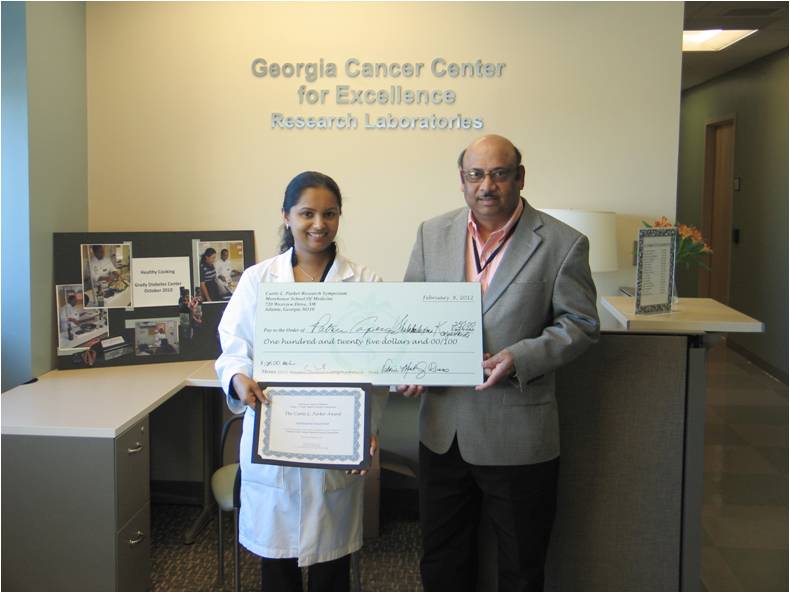
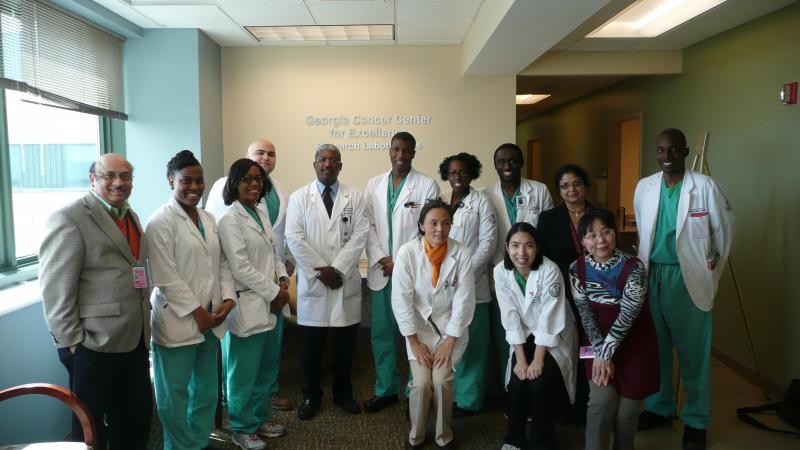
Genes/Gene functions discovered by us:
REFERENCES
1. ERG-1 3476934 PNAS, Oncogene
2. ERG-2 3299708 Science, Oncogene
3. ERG-3 8290279 Oncogene
4. ELK-1 2539641 Science, Nature, Cancer Res
5. ETS-2 1741383
6. ETS-1a 3060801 Oncogene
7. Human Fli-1 1394211 Cancer Res, Oncogene
8. Fli-1b 9764825 Oncogene
9. EWSb 8084618 Oncogene
10. EWS-Fli-1 7503813 Cancer Res, Oncogene
11. EWS-ERG 8084618 Oncogene
12. TLS/FUS-ERG 7970732 Oncogene
13.TLS/FUS 7970732 Oncogene
14. EWS-ATF-1 8552387 Oncogene
15. BRCA2a 10023017 Oncogene, Nature
16. PTENb Unpublished
17. BRCA1a 9538156 Oncology Rep.
18. BRCA1b 9538156 Oncology Rep.
19. Delta ELK-1 8417810 Cancer Res.
20. mi-PEP-200a In PRESS
21. mi-PEP-200b In PRESS
22. H2-K K Gene 3840763 Gene
23. Seminalplasmin 377100
377101 (Nature Back to back papers) Ph.D. Thesis
Georgia Bio innovation Summit Oct, 2021
miPEP-200b and miRNA200b: a Novel Approach for Developing Targeted Pharmacotherapy.
Sepehr Saberian, Sharif Morsalin, Jinbo Fang, Veena N Rao and E. Shyam P Reddy. miPEP-200b and miRNA200b: a Novel Approach for Developing Targeted Pharmacotherapy. Georgia Bio innovation Summit Oct, 2021.
(Presentation by MD,MBA student Sepher Saberian)
Our passion is to find a cure to cancer. Nothing great can be achieved without a passion
"The postings on this site are my own and don't necessarily represent my
organization's positions, strategies or opinions."
Copyright this business. All rights reserved.
Dr E. Shyam P. Reddy,
Functionotherapeutics,
Professor and Director, Cancer Biology Program, Dept of OB/GYN, Morehouse School of Medicine, 720 Westview Drive
Atlanta, GA 30310
United States
ph: 404-756-5230
fax: 678-623-5999
ereddy





